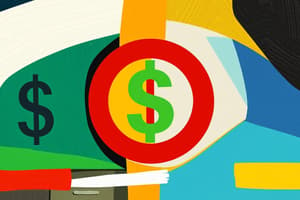Podcast
Questions and Answers
What is a credit?
What is a credit?
- A deduction from what is owed (correct)
- Money being borrowed (correct)
- The same as a debit card
- An expense incurred
A credit card is the same as a debit card.
A credit card is the same as a debit card.
False (B)
What typically determines the cost of borrowing money?
What typically determines the cost of borrowing money?
Interest rate
How should consumers compare needs versus wants when using credit?
How should consumers compare needs versus wants when using credit?
What is the grace period for a credit card?
What is the grace period for a credit card?
The percentage of net income used for credit payments should not exceed _____%.
The percentage of net income used for credit payments should not exceed _____%.
What do banks provide account holders by law?
What do banks provide account holders by law?
What does the Electronic Fund Transfer Act provide protection against?
What does the Electronic Fund Transfer Act provide protection against?
Which phrase describes overdraft protection?
Which phrase describes overdraft protection?
Fees can always be waived by keeping a specific amount of money in an account.
Fees can always be waived by keeping a specific amount of money in an account.
What is a stop payment order?
What is a stop payment order?
What is the liability limited to on stolen credit cards?
What is the liability limited to on stolen credit cards?
What happens if you exceed your credit limit?
What happens if you exceed your credit limit?
What is a finance charge?
What is a finance charge?
Match the terms with their definitions:
Match the terms with their definitions:
Flashcards are hidden until you start studying
Study Notes
Credit
- Represents a reduction in owed amounts, enabling delayed payments for goods bought with borrowed money.
- No physical tracking of available funds, differing from cash.
Debit vs. Credit Cards
- Credit card functions differ from debit cards; credit involves borrowing while debit deducts funds directly.
- Interest rates represent borrowing costs, typically expressed as a percentage.
- Usage of credit cards for consumable goods has implications for employment and credit history.
- Credit card grace period is the time between receipt of the card and payment due date.
- Recommended credit payment should not exceed 20% of net income.
- A significant percentage of college freshmen face late credit card payments.
- Smart credit use includes assessing needs versus wants and using credit for durable goods.
Checking and Savings Accounts
- Checking accounts facilitate easy cash and check deposits, allowing direct bill payments and withdrawals.
- Withdrawals can utilize checks, ATMs, or debit cards.
- Savings accounts typically serve to accumulate funds for future purchases or vacations.
Overdraft Protection
- Provides assurance that checks and debits will be honored up to a predetermined limit.
- Interest accrues until the overdraft is repaid; requires good credit.
Account Information
- Banks are mandated to provide periodical updates on account activity and balance.
Electronic Fund Transfer Act
- Offers protection against electronic transaction errors, such as incorrect withdrawals.
- Complaints regarding errors must be filed within 60 days after the statement date.
Fees
- Standard fees include charges for exceeding check writing limits and ATM usage.
- Maintaining a specific balance can exempt users from some fees.
Stop Payment Order
- Written notice instructs a bank to refrain from processing a specific check, usually accompanied by a small fee.
Risks of Theft
- Liability for stolen credit cards is limited to $50 if reported promptly; potential losses from debit card theft can be unlimited if not reported within 60 days.
Debit Card
- Functions similarly to a check card, deducting the purchase amount directly from a bank account.
Creditors and Debtors
- Creditors are entities that lend money or extend credit; debtors are individuals who borrow funds and delay repayment.
Finance Charge
- Refers to the cost associated with borrowing money, contrasting the interest earned on savings accounts.
Secured vs. Unsecured Credit
- Unsecured credit does not require collateral, while secured credit requires property or collateral as a guarantee.
Default
- Default refers to the failure to meet legal financial obligations, such as loan repayments.
Exceeding Credit Limit
- Can lead to negative credit reporting, account termination, or imposition of fees.
Monthly Charge / Commitment Fee
- Paying the full balance on or before the due date ensures no extra fees, with variations depending on bank policies.
Benefits of Credit
- Offers rewards such as airline tickets and potential for lower rates with good credit history.
Lost or Stolen Credit Cards
- Immediate reporting to the issuing company is crucial, providing necessary details like account number and contact information.
Studying That Suits You
Use AI to generate personalized quizzes and flashcards to suit your learning preferences.




